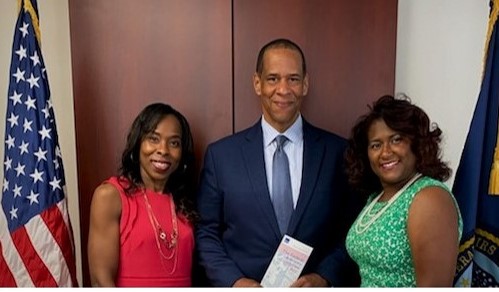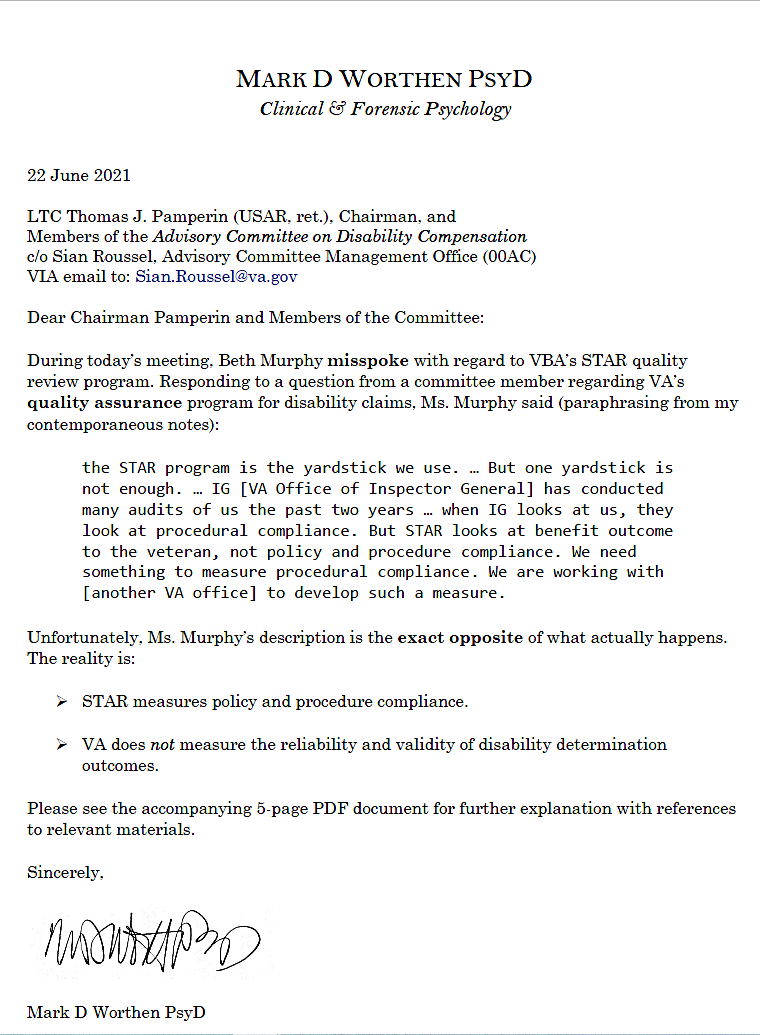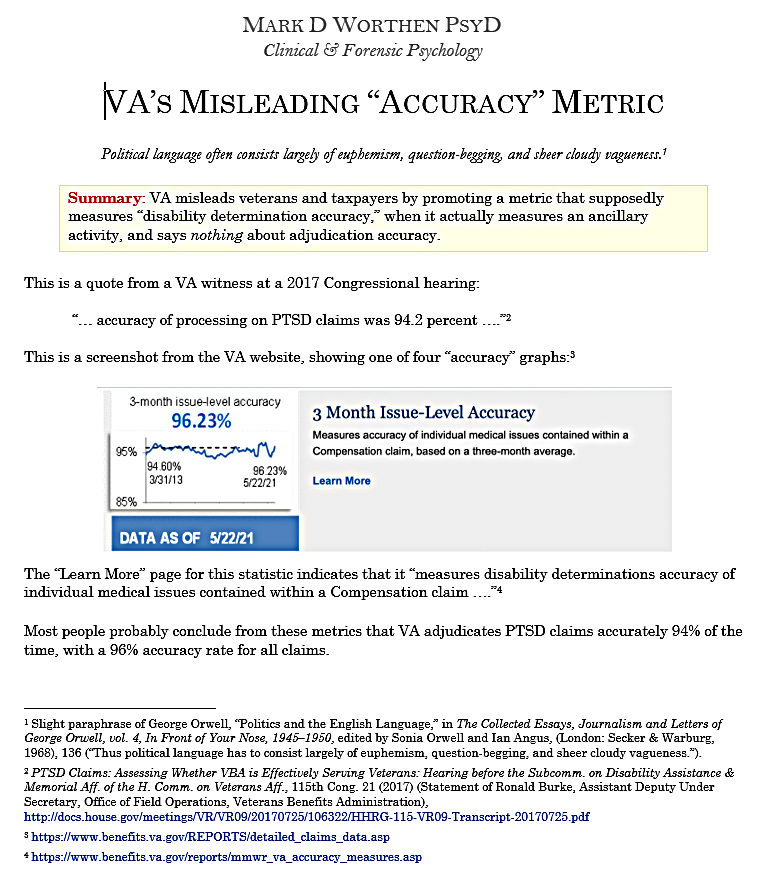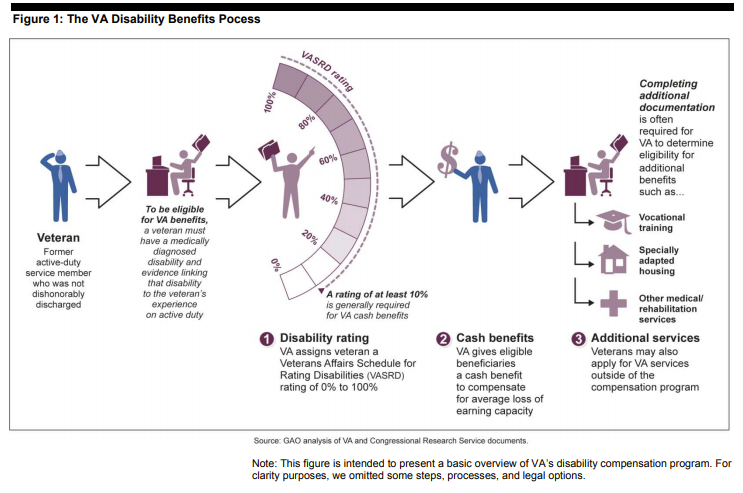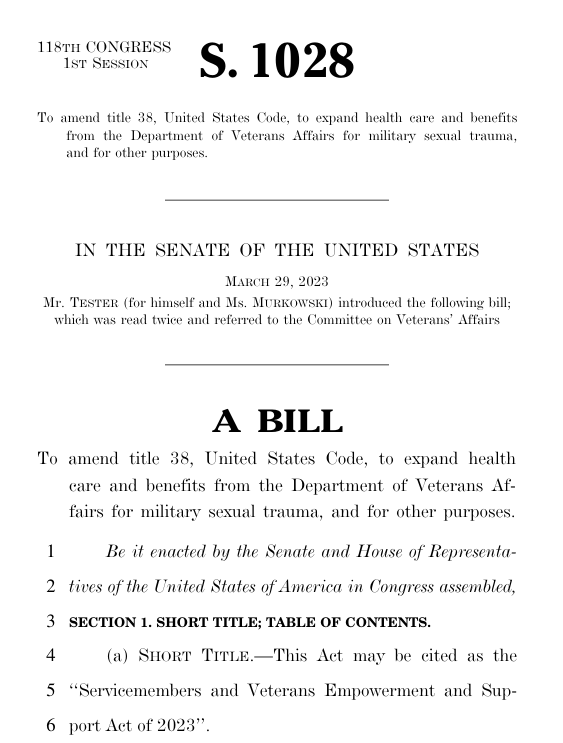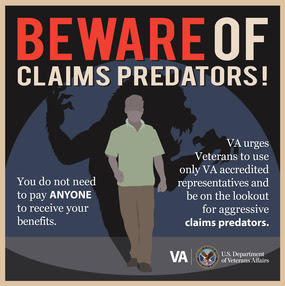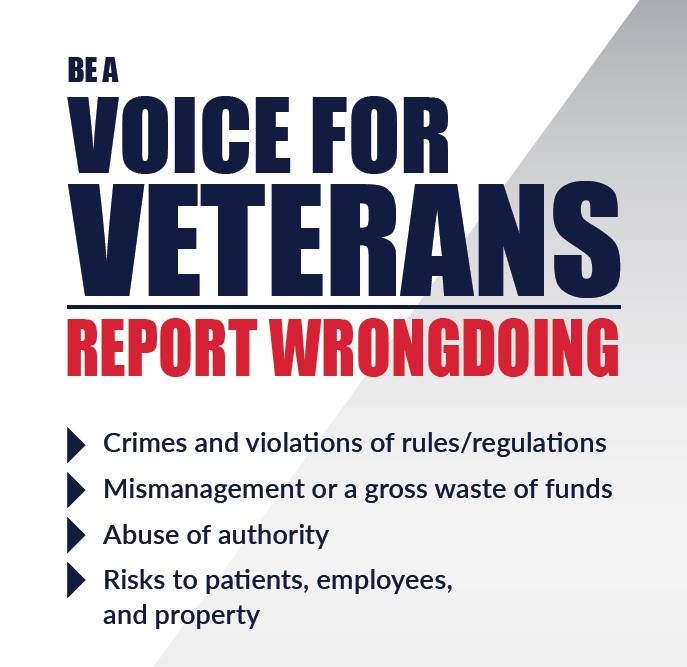- Home
- Federal Policies for Veterans
- Advisory Committee on Disability Compensation
Advisory Committee on Disability Compensation
This page explains the purpose of the Advisory Committee on Disability Compensation; provides regular updates about Committee meeting dates; post-meeting summaries; and links to the official Committee meeting minutes.
On this page ...
φ Introduction: What does this Advisory Committee on Disability Compensation Do?
- June 2021 ACDC Meeting - Review
- Positive Aspects of the June 2021 ACDC Meeting
- Positive Aspect: VASRD Mental Disorders Update
- Concerning Aspect of the June 2021 ACDC Meeting
- Committee Wants More Info on VBA Quality Assurance Program
- VA Office of Inspector General also takes issue with VBA's claim that they measure disability claims outcome
- VA Office of Inspector General reports about VBA's quality assurance program
- My Letter to the Committee re: VA's Misleading "Accuracy" Metric
- VA's Misleading "Accuracy" Metric (opens new window; 5-page PDF document)
- The Board of Veterans Appeals also publishes a misleading "accuracy" statistic
φ Meeting Minutes for the Advisory Committee on Disability Compensation - links to PDF copies of all meeting minutes since May 2020.
PTSDexams.net is an educational site with no advertising and no affiliate links. Dr. Worthen conducts Independent Psychological Exams (IPE) with veterans, but that information is on his professional practice website.

Introduction: What Does this Advisory Committee Do?
The Advisory Committee on Disability Compensation is a "statutory" federal advisory committee, which means it is specifically authorized by a United States statute: 38 U.S.C. § 546.
The Committee's purpose, defined in the statute, is to advise the Secretary of Veterans Affairs regarding the maintenance and periodic readjustment of the schedule for rating disabilities [VASRD]; and to:
- assemble and review relevant information relating to the needs of veterans with disabilities;
- provide information relating to the nature and character of disabilities arising from service in the Armed Forces;
- provide an on-going assessment of the effectiveness of the schedule for rating disabilities [VASRD]; and
- provide on-going advice on the most appropriate means of responding to the needs of veterans relating to disability compensation in the future.
Note: VASRD = VA Schedule for Rating Disabilities, 38 C.F.R. chap. 1, pt. 4.
There are a total of 27 VA advisory committees; 17 statutory, and 10 non-statutory, all of which are designed to provide advice on selected VA programs and policies.
U.S. General Services Administration (GSA) Committee Management Secretariat
If you serve on the Advisory Committee for Disability Compensation, I highly recommend reviewing services provided by the GSA Committee Management Secretariat, such as:
- Two-day training program from Federal Advisory Committee Act (FACA) subject matter experts.
- Individual consultation with Committee Chairs and and Members (of a Federal Advisory Committee).
- Advice and guidance on establishing and managing federal advisory committees.
Advisory Committee on Disability Compensation Meeting: June 22–23, 2021
June 2021 ACDC Meeting - Review
I was able to watch and participate (via the chat function) both days of the June 2021 Advisory Committee on Disability Compensation (ACDC) meeting.
Positive Aspects of the June 2021 ACDC Meeting
Here's a list of positive aspects of the meeting:
* The chat function (new for the Committee) gives the public a chance to submit comments and questions during the meeting. The Committee does not have time to address every chat comment or question, but they responded to a few.
* The Committee included chat comments in the meeting minutes.
* Jeffrey A. Moragne, Director, VA Advisory Committee Management Office gave a presentation on a Federal Advisory Committee's duties. His presentation was not only very informative, he delivered it with aplomb. It was crisp, articulate, and personable.
Positive Aspect: VASRD Mental Disorders Update
* We learned a bit of new information about the revision to the Mental Disorders portion of the VA Schedule for Rating Disabilities (VASRD) "will now evaluate based on impairment in five facets of life rather than simply based on symptoms. Ms. Che added that mental disorders are now rated based on WHO standards for functional impairment so that portion is more aligned with current medical standards."
Ms. Che is Jane Che, Director, Veterans Affairs Schedule for Rating Disabilities (VASRD) Program Management Officer (PMO), Regulations Staff, Compensation Service, VBA.
I commented in the chat, "the members of VA’s Mental Disorders VASRD Work Group included some very knowledgeable and experienced VA psychologists."
Note that the Mental Disorders section of the VASRD has a unique name: General Rating Formula for Mental Disorders.
The VASRD is a federal regulation found at 38 C.F.R., pt. 4, subpt. B.
The General Rating Formula for Mental Disorders is found at 38 C.F.R. § 4.130, below the list of VBA Diagnostic Codes (DC)—the last DC in the list is "9440 Chronic adjustment disorder"—you will find the General Rating Formula immediately below that.
VA has a helpful explanation for veterans: About VA disability ratings.
Concerning Aspect of the June 2021 ACDC Meeting
On the first meeting day (22 Jun 2021), VBA leaders Beth Murphy and Laurine Carson gave a presentation titled (in the minutes), "VA/VBA 101 - Compensation Service". During the presentation a Committee member, Al Bruner, asked for more information on the VBA quality assurance program. From the meeting minutes:
Al Bruner stated the Committee should receive more information on Compensation Service’s QA (Quality Assurance) program.
Ms. Carson [I think it was actually Beth Murphy] replied that the STAR (Systemic Technical Accuracy Review) program has been used to measure for quality, but more than one method is needed moving forward to include procedural compliance not just the end result.
Chair Pamperin stated that when evaluating procedure there is a need to identify what effect the process really has on the outcome to make sure that proper and effective changes are made.
Committee Wants More Info on VBA Quality Assurance Program
Kudos to Mr. Bruner for asking the question! And Mr. Pamperin's comment is spot on: Outcome (the ultimate decision regarding a veteran's disability claim) is the crucial variable to measure.
Unfortunately VBA's response gave erroneous information. I faxed a letter to the Committee expressing my concern.
My Letter to the Committee re: VA's Misleading "Accuracy" Metric
My Concern Shared with Committee Members
From the meeting minutes:
Chair Pamperin read the first page and made reference to remaining pages of a letter submitted by a clinical and forensic psychologist, Dr. Mark D. Worthen.
The letter stated that yesterday Ms. Murphy misspoke when she said the STAR program was the yardstick they use regarding the Quality Assurance program.
Dr. Worthen wrote that STAR measures policy and procedural compliance.
Chair Pamperin stated they will need to get more information regarding specifically what STAR is measuring when they next have a STAR briefing. He informed all members that they would receive a copy of the letter.
VA Office of Inspector General also takes issue with VBA's claim that they measure disability claims outcome
From the meeting minutes (p. 10):
Hello everyone. I am Brent Arronte, Deputy Assistant Inspector General for Audits and Evaluations for the Department of Veterans Affairs.
As there seems to be interest in VBA's STAR program, I would like to bring to everyone's attention that the OIG conducted a review of VBA's 4 major quality assurance components.
In addition, we issued a report summarizing our work on those components that identified the weaknesses found during those reviews.
Once read, you will see the OIG does not only look at procedural issues as indicated by Ms. Murphy yesterday.
These reports are found on the OIG public facing website.
VA Office of Inspector General reports about VBA's quality assurance program
I found four reports that include the statement, "This review is one in a series of five VA OIG reports regarding VBA’s quality assurance program." Here are those four reports, with a selected quote from each report.
The Systematic Technical Accuracy Review Program Has Not Adequately Identified and Corrected Claims-Processing Deficiencies, Report #19-07059-169 (22 Jul 2020).
"The OIG team examined a statistical sample of 100 claims from which it estimated that about 55 percent of claims had deficiencies, including:
· Benefit-entitlement errors that could affect veterans’ disability compensation payments, and
· Procedural deficiencies such as having to report for an unnecessary examination."
Deficiencies in the Quality Review Team Program, Report #19-07054-174 (22 Jul 2020).
"The OIG found that QRT specialists did not identify a significant number of claims-processing errors that should have been identified. Based on a statistical sample, the OIG estimated that 9,900 of the 28,400 quality reviews (35 percent) completed during the review period contained missed claims-processing errors that should have been identified."
Site Visit Program Can Do More to Improve Nationwide Claims Processing, Report #19-07062-230 (18 Aug 2020).
"Limitations with VBA’s oversight of the site visit program prevented it from driving nationwide improvements in disability claims processing. ... The deputy under secretary for field operations expected regional office managers to be aware of issues raised in other regional office site visit reports, but no written policy required managers to review or address error trends."
Greater Consistency Study Participation and Use of Results Could Improve Claims Processing Nationwide, Report #19-07062-255 (29 Sep 2020).
"The OIG concluded that with VBA’s emphasis on production, which can undermine overall accuracy, it is especially important for the Office of Field Operations to require regional office managers to follow up on the results of consistency studies taken by their personnel and take corrective action as needed. By not following up on the consistency study results, the Office of Field Operations has not taken advantage of available options to improve staff performance."
Links to relevant documents
Here are links to relevant material (all PDF documents):
June 2021 Advisory Committee on Disability Compensation Meeting Minutes
Letter from Dr. Worthen to the Advisory Committee on Disability Compensation (22 Jun 2021)
VA's Misleading "Accuracy" Metric (the 5-page PDF document I mentioned in my letter)
The Board of Veterans Appeals also publishes a misleading "accuracy" statistic
Here is a quote about research on the Board of Veterans Appeals (BVA) quality assurance program and its misleading "accuracy" numbers.
Measuring accuracy or gaming statistics?
The reasons for the ineffectiveness, [Stanford Professor] Ho explained, are the cross-purposes of quality review. The same agency charged with its own quality review faces a competing interest in trying to keep case numbers and accuracy high for its performance measures, which in turn affect its funding allocations. For over a decade, the BVA has published and touted its “accuracy rate” to Congress and the public as being between 91 and 95 percent.
In their analysis, however, researchers found that BVA deployed an extremely deferential way of counting errors, inflating the agency’s measure of accuracy. When the quality review team deemed the decision error-free and the case was appealed further, it was still remanded – sent back to the agency – nearly three-fourths of the time.
“It is well-known in the social science literature that creating your own performance measures poses conflicts of interest,” Ho said. “We found that over time, the quality review process was used to generate the appearance of effectiveness [rather] than to actually improve performance.” [emphasis added]
That quote is from:
Wong, May. "New Research Finds Flaws in Veterans' Claims System." Stanford Institute for Economic Policy Research (6 Mar 2019).
Here is the citation for the research article:
Ho, Daniel E., Cassandra Handan-Nader, David Ames, and David Marcus. "Quality Review of Mass Adjudication: A Randomized Natural Experiment at the Board of Veterans Appeals, 2003–16." Journal of Law, Economics, and Organization 35, no. 2 (2019): 239-288. https://doi.org/10.1093/jleo/ewz001 [paywall]
An author's prepublication copy of the article is available here:
https://siepr.stanford.edu/sites/default/files/publications/19-005.pdf
See also:
Ames, David, Cassandra Handan-Nader, Daniel E. Ho, and David Marcus. "Due Process and Mass Adjudication: Crisis and Reform." Stanford Law Review 72, no. 1, 1–78 (January 2020).
Meeting Start Times in Various U.S. Locations*
The table below shows the start times for the Advisory Committee on Disability Commission meeting on Tuesday, June 22, and Wednesday, June 23, 2021 in several United States locations.
Consult the table below or the Event Time Announcer on timeanddate.com
|
Location |
Start Time |
Time Zone |
|
Honolulu |
0300 |
HST |
|
Anchorage |
0500 |
AKDT |
|
San Francisco |
0600 |
PDT |
|
Phoenix |
0600 |
MST |
|
Denver |
0700 |
MDT |
|
Chicago |
0800 |
CDT |
|
Washington, DC |
0900 |
EDT |
|
Puerto Rico |
0900 |
AST |
|
U.S. Virgin Islands |
0900 |
AST |
|
Guam |
2300 |
ChST |
*Each of these locations has a Veterans Benefits Administration (VBA) office.
Remember you will not be able to speak during the meetings, but you can listen to the proceedings.
The call-in number for those who would like to listen to the meeting is: 1– 404–397–1596; access code: 199 374 5143.
Advisory Committee on Disability Compensation: Meeting Minutes
The Advisory Committee on Disability Compensation (ACDC) posts meeting minutes on its home page. However, they post only the most recent minutes.
Starting in 2020, I began to post meeting minutes on this website (PTSDexams.net) so that you would have access to previous meeting summaries.
Starting in November 2021 the Committee started calling their minutes "summary notes".
Meeting minutes (PDF files) can be downloaded by clicking on the links below.
- VA Advisory Committee on Disability Compensation November 2021 Summary Notes, https://perma.cc/A887-7WUB
- VA Advisory Committee on Disability Compensation June 2021 Meeting Minutes, https://perma.cc/TBB7-QL7U
- VA Advisory Committee on Disability Compensation December 2020 meeting minutes, https://perma.cc/F46W-KJS3
- VA Advisory Committee on Disability Compensation September 2020 meeting minutes, https://perma.cc/Z6S4-58J4
- VA Advisory Committee on Disability Compensation July 2020 meeting minutes, https://perma.cc/X6LY-4DSP
- VA Advisory Committee on Disability Compensation May 2020 meeting minutes, https://perma.cc/M6RQ-D3NC
You are here:
Subscribe to receive new articles and other updates
What Do You Think?
I value your feedback!
If you would like to comment, ask questions, or offer suggestions about this page, please feel free to do so. Of course, keep it clean and courteous.
You can leave an anonymous comment if you wish—just type a pseudonym in the "Name" field.
If you want to receive an email when someone replies to your comment, click the Google Sign-in icon on the lower right of the comment box to use Google Sign-in. (Your email remains private.)
↓ Please comment below! ↓
